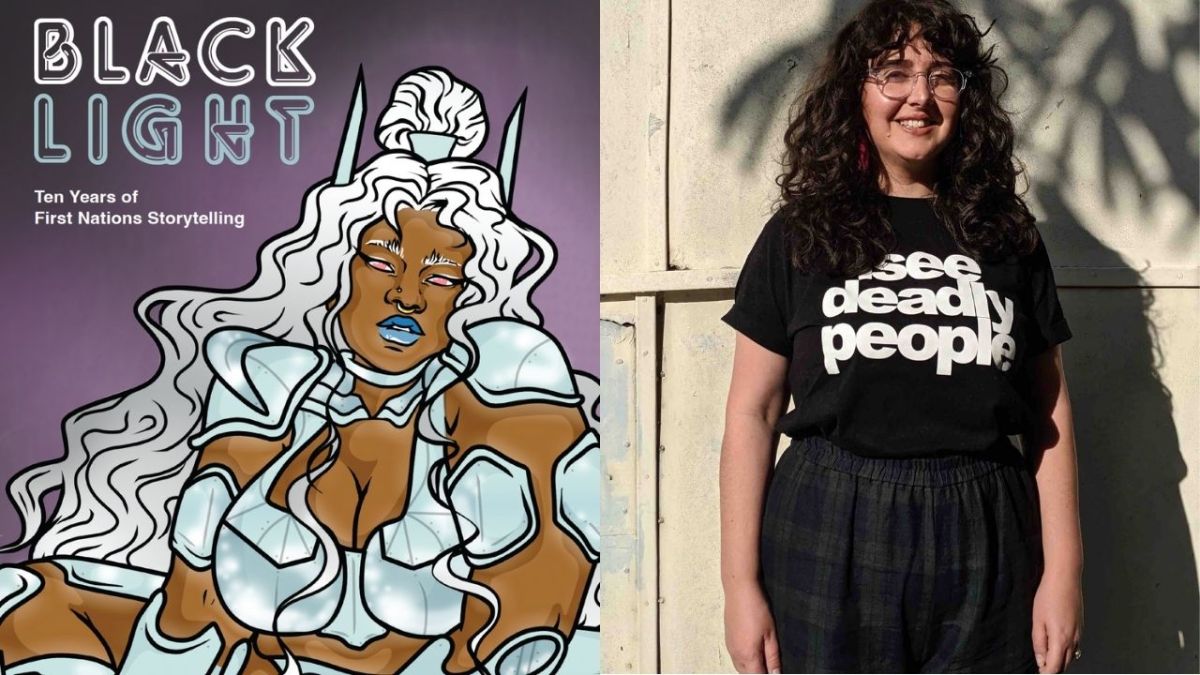To coincide with Indigenous Literacy Day, we look back to our story on Blacklight: Ten Years of First Nations Storytelling, recently been released by Sweatshop (2022). The Western Sydney Literacy Movement has collated a decade’s worth of writing and art by Aboriginal and Torres Strait Islander creatives into the one volume. Edited by Wiradjuri writer Hannah Donnelly, Blacklight features previous work published by Sweatshop, as well as new commissioned pieces.
The anthology continues Sweatshop’s determined imperative to bring to the fore stories from culturally diverse communities.
Blacklight’s editor, Donnelly, told ArtsHub: ‘[The book] illuminates the contemporary experiences of mob life and struggles, food, love and loss in Western Sydney and beyond. From future radical warriors, to the glory of El Jannah garlic sauce, these stories cover the complex cultural boundaries and responsibilities that exist for First Nations people in the continued colonial occupation of the Country they live on and the Countries they are from. We hope these works speak to migrant and refugee communities as well, and trust that, together, we can grow in the dark.’
ArtsHub invited a few contributors to tell us in their own words about their creative pieces.
Steven Lindsay Ross: “Liminal” is a dreamscape that explores material colonialism and the known and unknown realms of the Indigenous universe through the diasporic perspective of a Wamba Wamba queer man living on Dharug Country.’
Jazz Money: ‘I contributed a poem to the collection titled “How to make a basket”, a piece that was read and edited by Hannah long before I had a book of the same name! The poem was written in response to the 2019/2020 bushfires at a time when I was living on Darug and Gundungarra Countries in the Blue Mountains. It came from a place of great anger and frustration but was incredibly healing to write.’
Emma Hicks: ‘My offering is about negotiating pathways through fragments of memories and conversations. Acknowledging feelings of time and place blurring together and cracking open with multiple memories and remembered sensations. It also points to broader questioning around the maintenance of boundaries, social construct, healing, and embodied communication.’
Read: How a festival responded to election fever (sausage sizzle included)
Phoebe Grainer offers a salient reminder that ‘Aboriginal people have been storytelling for thousands of years, writing for me is continuing that cultural practice. I write to empower and uplift my community.’
I write to tell stories about us, our black skin, our black words, how our black bodies move through our beautiful land, how we see the world around us through our beautiful black eyes.
I write in hope to encourage my mob, I write in hope for awareness, to share in storytelling, to share in knowledge, I write in hope for political and social change across this land for mob.
Phoebe Grainer, contributor and sub-editor of Blacklight
Blacklight is out now.





